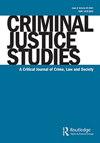军事战斗、心理健康和犯罪:一般应变理论模型的初步测试
IF 1.1
Q3 OPERATIONS RESEARCH & MANAGEMENT SCIENCE
引用次数: 2
摘要
研究表明,军事战斗经历会以消极的方式塑造后期的心理健康,并增加随后的反社会行为。迄今为止,有限的研究试图探索军事战斗经历是否与反社会行为有关,因为它增加了消极心理健康状态的可能性。以一般压力理论(GST)为指导,目前的研究提供了一个初步的测试,以军事战斗经验、以抑郁症状和创伤后应激障碍(PTSD)为重点的消极心理健康,以及以犯罪行为为重点的反社会行为,如何在一个单一的理论信息模型中联系在一起。Add Health样本的结果表明,军事战斗经历与抑郁症状、创伤后应激障碍和犯罪有关。此外,研究结果表明,创伤后应激障碍,而不是抑郁症状,可能在军事战斗经历和随后的犯罪行为之间起着潜在的中介作用。对理论和政策的启示进行了讨论。本文章由计算机程序翻译,如有差异,请以英文原文为准。
Military combat, mental health, and crime: A preliminary test of a general strain theory model
ABSTRACT Research has shown that military combat experience can shape later mental health in a negative fashion and increase subsequent antisocial behaviors. Limited research to date has attempted to explore if military combat experience is related to antisocial behaviors because it increases the likelihood of negative mental health states. Using general strain theory (GST) as a guide, the current study offers a preliminary test of how military combat experience, negative mental health, with a focus on depressive symptoms and posttraumatic stress disorder (PTSD), and antisocial behavior, with a focus on criminal behavior, might relate together in a single theoretically informed model. Results from the Add Health sample suggest that military combat experience correlates with depressive symptoms, PTSD, and crime. Further, results suggest that PTSD, but not depressive symptoms, could potentially act as a mediator between military combat experience and subsequent criminal behavior. Implications for theory and policy are discussed.
求助全文
通过发布文献求助,成功后即可免费获取论文全文。
去求助
来源期刊

CRIMINAL JUSTICE STUDIES
OPERATIONS RESEARCH & MANAGEMENT SCIENCE-
CiteScore
2.80
自引率
5.60%
发文量
17
期刊介绍:
Criminal Justice Studies, a quarterly refereed journal, publishes articles that deal with substantive criminal justice and criminological issues. The journal welcomes all articles that are relevant to the issue of criminal justice, as well as those that may be outside the field but have relevancy to the topic of criminal justice. Articles that cover public administration, issues of public policy, as well as public affairs issues are welcome. The journal also publishes relevant literature reviews, research notes and summary reports of innovative research projects in criminal justice. Qualitative and quantifiable articles are sought mainly from academics and researchers in the field, though articles from professionals will also be considered.
 求助内容:
求助内容: 应助结果提醒方式:
应助结果提醒方式:


